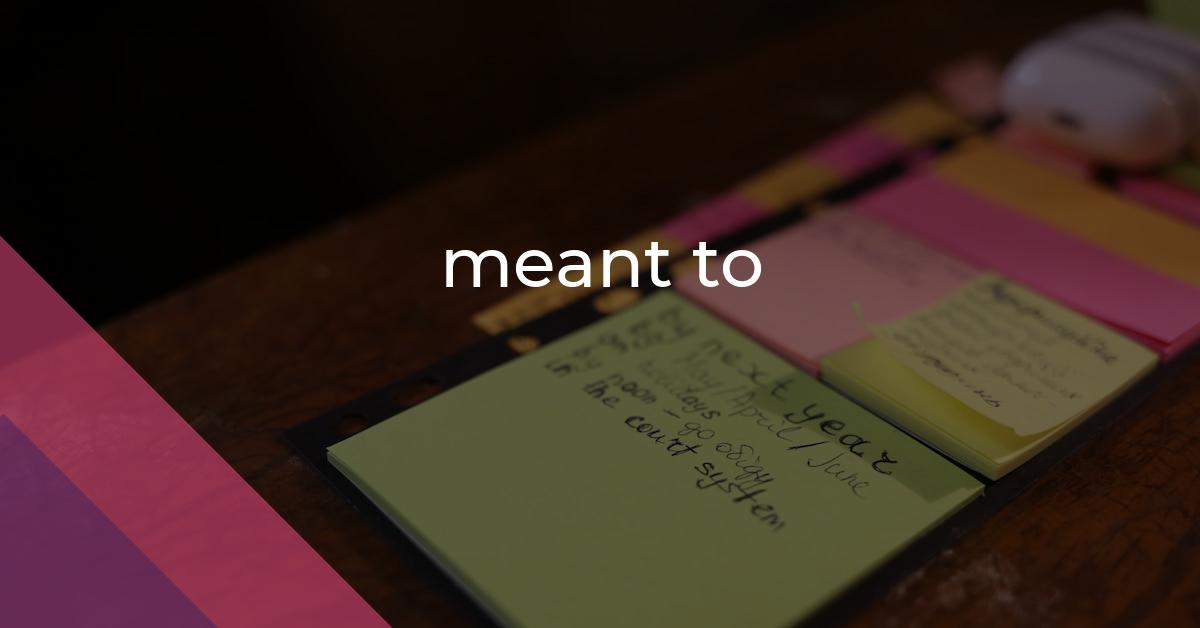meant to: Idiom Meaning and Origin
What does ‘meant to’ mean?
The idiom *meant to* means intended or designed for a specific purpose. It suggests that something was created or done with a particular intention or goal in mind.

Idiom Explorer
The idiom "with a view to" means having the intention or purpose of doing something. It implies a deliberate action taken with a specific goal in mind.
The idiom *put one's mind to it* means to concentrate or focus one's thoughts and efforts on a particular task or goal.
The idiom "more than meets the eye" means that there is more to something or someone than what is initially visible or apparent.
The idiom "more often than not" means that something is likely to happen or be true most of the time, although there may be exceptions occasionally.
The idiom "miss the mark" means to fail to reach a desired goal or objective.
The idiom "meet one's maker" means to die or to face death and meet God as the creator. It implies the belief that after death, a person will be judged by their actions in life.
The idiom "measure up" means to be equal to or reach a certain standard or expectation.
The idiom "mean the world to" is used to express the extreme importance or value someone or something has in a person's life or well-being.
The idiom "mean business" means to be serious and determined about achieving a goal or taking action.
Underlying Motives
One common idiom that is related to "meant to" is "with a view to." This phrase is used to indicate that something is done or planned with a specific goal or purpose in mind. It suggests that the action or intention is directed towards achieving a particular outcome. For example, someone might say, "I am studying for this exam with a view to getting a good grade."
Another related idiom is "mean business." This expression is used to convey a serious intent or determination in pursuing a particular goal or objective. It implies that someone is not just casually involved, but is fully committed to achieving their desired outcome. For instance, a person might say, "When I started my own business, I really meant business and worked hard to make it successful."
Similarly, "put one's mind to it" is another idiom that relates to "meant to." This phrase is used to emphasize the determination and focus one puts into accomplishing a task or achieving a goal. It suggests that someone is fully dedicated and focused on achieving their desired outcome. For example, someone might say, "If you put your mind to it, you can accomplish anything you set out to do."
Another idiom related to "meant to" is "mean the world to." This expression is used to convey deep affection, love, or importance towards someone or something. It suggests that someone or something holds an incredibly special or significant place in one's heart or life. For instance, a person might say, "My family means the world to me. I don't know what I would do without them."
Finally, "made for each other" is an idiom that also connects to "meant to." This phrase is used to describe two people who are perfectly suited for each other and seemingly destined to be together. It suggests a strong compatibility and connection between two individuals. For example, someone might say, "John and Sarah are truly made for each other. They complement each other in every way."
These various idioms that are related to "meant to" add depth and nuance to the way individuals express intention, determination, affection, and destiny. They provide additional shades of meaning and enhance the overall communication when used in conjunction with "meant to."
"meant to" is an idiomatic expression that has multiple uses and meanings. It can convey intention, obligation, missed opportunities, dissatisfaction, and more. It is a versatile phrase that can be used in a conversational and informal style, adding richness to communication. When paired with related idioms such as "with a view to," "mean business," "put one's mind to it," "mean the world to," and "made for each other," the true intent and meaning behind "meant to" can be further enhanced and understood.
Example usage
Examples of how the idiom meant to can be used in a sentence:
- I forgot to water the plants this morning, but I meant to do it later in the afternoon.
- She was meant to be at the meeting, but she got stuck in traffic and couldn't make it on time.
- He received a letter meant to be delivered to his neighbor, so he dropped it off at their doorstep.
More "Usage" idioms



